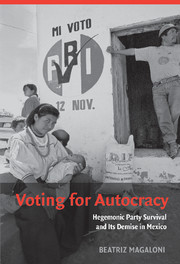Book contents
- Frontmatter
- Contents
- Acknowledgments
- INTRODUCTION
- 1 EQUILIBRIUM PARTY HEGEMONY
- 2 STRUCTURAL DETERMINANTS OF MASS SUPPORT FOR THE PRI
- 3 BUDGET CYCLES UNDER PRI HEGEMONY
- 4 THE POLITICS OF VOTE BUYING
- 5 JUDGING ECONOMIC PERFORMANCE IN HARD TIMES
- 6 IDEOLOGICAL DIVISIONS IN THE OPPOSITION CAMP
- 7 HOW VOTERS CHOOSE AND MASS COORDINATION DILEMMAS
- 8 ELECTORAL FRAUD AND THE GAME OF ELECTORAL TRANSITIONS
- 9 CONCLUSION
- References
- Index
- Cambridge Cultural Social Studies
6 - IDEOLOGICAL DIVISIONS IN THE OPPOSITION CAMP
Published online by Cambridge University Press: 06 August 2009
- Frontmatter
- Contents
- Acknowledgments
- INTRODUCTION
- 1 EQUILIBRIUM PARTY HEGEMONY
- 2 STRUCTURAL DETERMINANTS OF MASS SUPPORT FOR THE PRI
- 3 BUDGET CYCLES UNDER PRI HEGEMONY
- 4 THE POLITICS OF VOTE BUYING
- 5 JUDGING ECONOMIC PERFORMANCE IN HARD TIMES
- 6 IDEOLOGICAL DIVISIONS IN THE OPPOSITION CAMP
- 7 HOW VOTERS CHOOSE AND MASS COORDINATION DILEMMAS
- 8 ELECTORAL FRAUD AND THE GAME OF ELECTORAL TRANSITIONS
- 9 CONCLUSION
- References
- Index
- Cambridge Cultural Social Studies
Summary
Opposition coordination failure played a significant role in sustaining the dominance of the PRI. Patterns in local elections during the last twenty years demonstrate that the PRI tended to win more often where the opposition stood divided. By contrast, the PRI tended to lose more often in states or municipalities where a bipartisan mode of party competition prevailed, with the PRI competing against one major opposition party, or where all-encompassing opposition coalitions were forged (Diaz-Cayeros and Magaloni, 2001).
Do policy divisions play a role in inhibiting opposition voter coordination? To answer this question, I designed, with Rafael Giménez, a survey that was conducted by Reforma newspaper in July of 1995. A total of 509 respondents were surveyed in three cities: Mexico City, Guadalajara, and Monterrey. Seventeen issues were included in the survey, following the standard National Elections Study format of seven-point policy scales. Respondents were asked to locate their own position on the scale and then to locate their perceived positions of the PRI, the PAN, and the PRD on the same scale. The survey is not representative of the rural poor, and I do not claim that any of the findings in this chapter extend to the Mexican countryside.
The chapter unfolds as follows. I first discuss the research on coordination failure. The following section seeks to provide evidence of chronic voter uncertainty about the parties' issue positions. Finally, the chapter estimates the impact of the issues on voting intentions.
- Type
- Chapter
- Information
- Voting for AutocracyHegemonic Party Survival and its Demise in Mexico, pp. 175 - 192Publisher: Cambridge University PressPrint publication year: 2006



